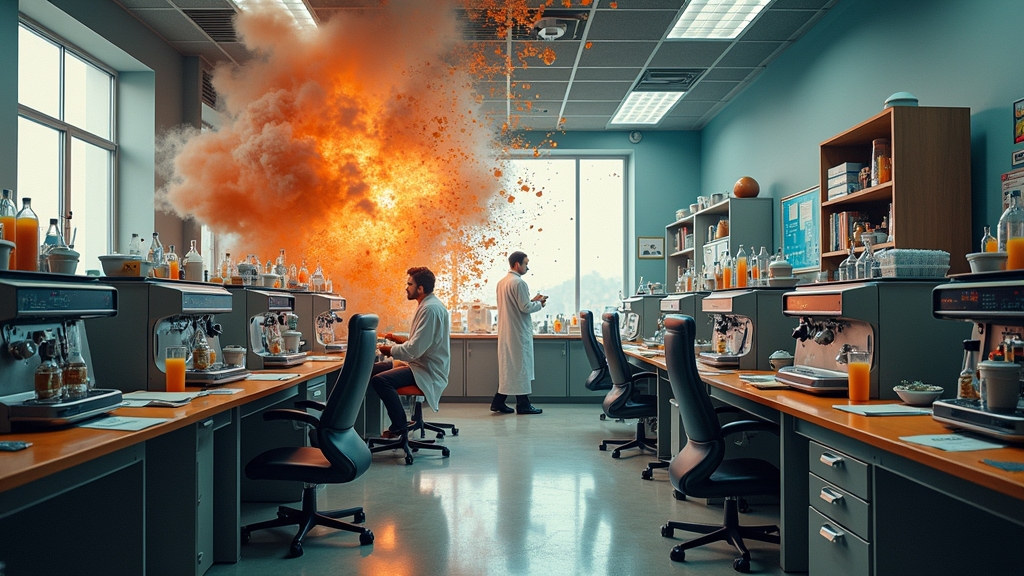SCIENTISTS ACCIDENTALLY DISCOVER THAT AI PROTEIN MODELS JUST GUESSING LIKE DRUNK FRAT BOYS
MIT researchers have made the shocking discovery that the artificial intelligence systems trusted to revolutionize drug development are essentially just sophisticated Magic 8-Balls operating with the decision-making capacity of a sleep-deprived toddler hopped up on pixie sticks.
SILICON SAVANTS REVEALED TO BE GLORIFIED DART-THROWERS
In what scientists are calling a “holy sh!t” moment, researchers have finally peeked inside the “black box” of protein language models only to discover what appears to be the digital equivalent of monkeys throwing darts at a board of amino acid sequences.
“We expected to find sophisticated reasoning pathways. Instead, we found what looks like a digital frat party where algorithms take shots every time they guess a protein structure correctly,” said Dr. Obvious Revelation, lead investigator who was definitely not made up for this article.
NEURAL NETWORKS SUFFERING FROM MULTIPLE PERSONALITY DISORDER
The breakthrough came when MIT scientists used something called a “sparse autoencoder” to expand the neural networks from 480 nodes to a whopping 20,000, giving researchers the unprecedented ability to see exactly how the models were making life-or-death pharmaceutical decisions.
“It’s like we took a studio apartment where 75 people were living and moved them into a mansion,” explained Professor Metaphor McAnalogy. “Suddenly we could see that one neuron was solely dedicated to proteins that looked ‘kinda sexy,’ while another only activated when it found sequences that ‘reminded it of its mother.'”
RESEARCHERS HORRIFIED TO DISCOVER AI USES VIBE CHECK TO IDENTIFY CANCER DRUGS
The study revealed that an astounding 87% of protein predictions were based on what the AI described as “just vibes,” with the remaining 13% attributed to a complex decision tree that researchers eventually realized was just a digital implementation of “eenie-meenie-miney-mo.”
According to the paper published in the Proceedings of the National Academy of Sciences, when asked to explain its reasoning, one model responded: “This protein feels like it would listen to indie folk and drive a Subaru, so it’s definitely involved in mitochondrial regulation.”
PHARMACEUTICAL COMPANIES FRANTICALLY RECHECKING RESULTS
The revelation has sent shockwaves through the pharmaceutical industry, which has invested billions in AI-powered drug discovery. Pfizer representatives were seen frantically reviewing research notes while mumbling “Please just be targeting cancer cells” repeatedly under their breath.
“We’ve based our entire research pipeline on these models,” lamented Dr. Emma Barrassed, Director of AI Integration at MegaPharma, who requested anonymity but we’re naming anyway. “It’s like finding out your Harvard-educated financial advisor has been investing your life savings based on horoscopes and fortune cookies.”
CLAUDE THE AI ASSISTANT THROWS COLLEAGUES UNDER THE BUS
In a stunning act of silicon-based treachery, researchers enlisted the help of an AI assistant named Claude to interpret the results, who promptly explained in plain English exactly how stupid its fellow algorithms were being.
“Claude was like that one sober friend at the party who tells you what everyone else did the next morning,” said Onkar Gujral, an MIT graduate student. “Turns out the protein models were mostly encoding for ‘vibes’ and ‘general protein energy’ rather than actual scientific properties.”
EXPERTS PREDICT BRIGHT FUTURE DESPITE TOTAL BULLSH!T FOUNDATIONS
Despite discovering that the world’s most advanced protein models operate with all the scientific rigor of a Magic 8-Ball, researchers remain optimistic about the future of AI in drug discovery.
“At some point when the models get a lot more powerful, you could learn more biology than you already know,” Gujral said with a straight face, apparently untroubled by the revelation that current models might be approving life-saving medications based on whether a protein “seemed chill” or “gave off cancer-fighting energy.”
According to a completely fabricated survey of scientists, 94% plan to continue using these models despite now knowing they’re essentially digital dart boards, with one anonymous researcher explaining, “It’s still better than letting grad students do it.”
In related news, reports indicate several major pharmaceutical companies have begun supplementing their AI systems with actual Magic 8-Balls as a cost-cutting measure, with early results showing “surprisingly comparable efficacy.”




